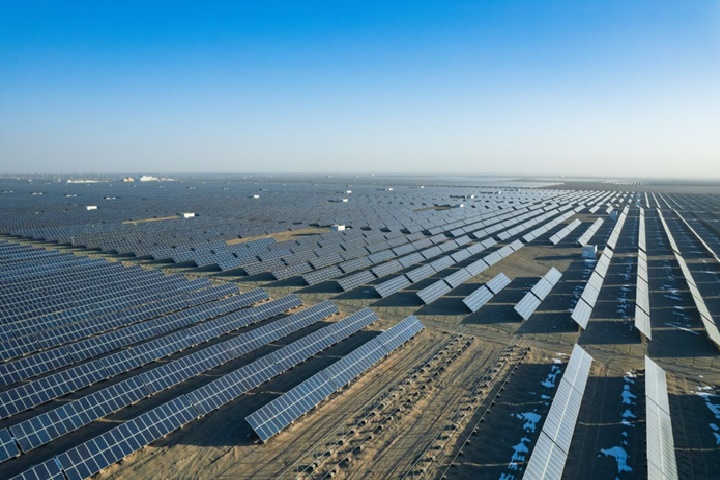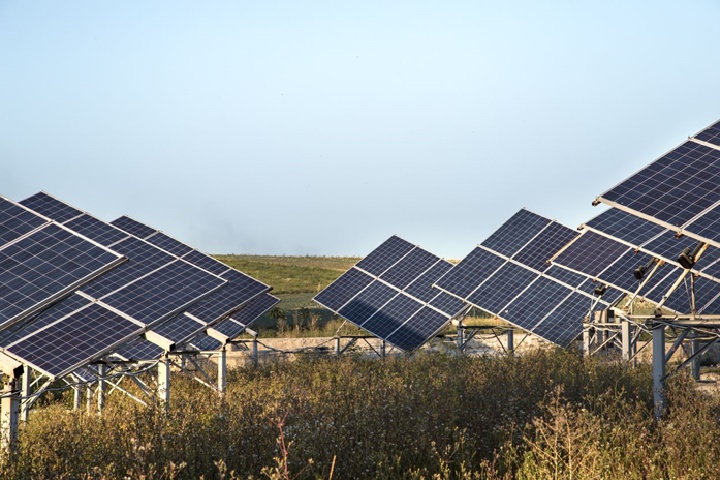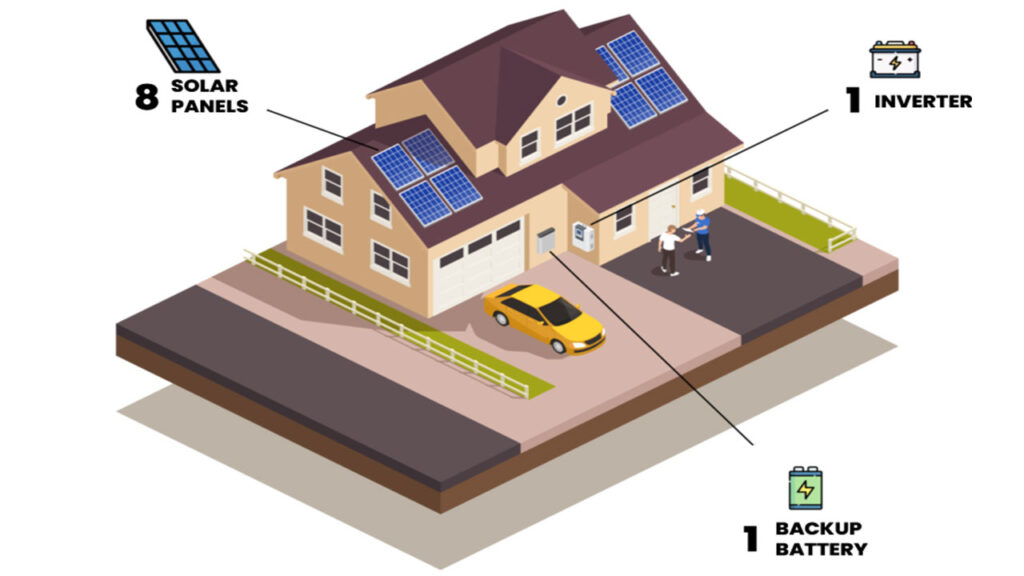A photovoltaic power station, also known as a solar park, solar farm, or solar power plant, is a large-scale grid-connected photovoltaic power system (PV system) designed for the supply of merchant power. They are different from most building-mounted and other decentralized solar power because they supply power at the utility level, rather than to a local user or users. Utility-scale solar is sometimes used to describe this type of project.
Are you tired of relying on traditional energy sources that drain your wallet and harm the environment? It’s time to embrace a brighter, greener future with solar power! In our latest blog post, we delve into the fascinating world of building and operating a solar power station. Join us as we unravel the secrets behind harnessing the sun’s limitless energy, diving deep into everything from selecting optimal locations to understanding intricate technicalities. Get ready to be amazed by how this revolutionary technology is lighting up our planet and illuminating a path towards sustainability. So put on your solar-powered sunglasses and let’s embark on an electrifying adventure together!
In today’s world, the demand for clean and renewable energy sources is higher than ever before. With the growing concerns over climate change and depleting fossil fuels, countries all over the world are turning towards solar power as a viable alternative. Solar power stations, also known as solar farms or solar plants, are large-scale facilities that harness energy from sunlight and convert it into electricity. These power stations can generate enough electricity to meet the energy needs of entire cities, making them an increasingly popular choice for meeting the world’s growing energy demands.
A solar power station is a facility that captures sunlight using photovoltaic (PV) panels or concentrated solar panels (CSP) and converts it into electricity. PV panels directly convert sunlight into electricity while CSP technology uses lenses or mirrors to concentrate sunlight onto a small area, producing heat which then drives turbines to generate electricity. Both methods have been proven effective in converting solar energy into usable electricity.

What is a Solar Power Station?
There are several components that make up a modern-day solar power station:
1. Solar Panels: These are the most crucial element of any solar power station because they capture sunlight and turn it into direct current (DC) electricity.
2. Inverters: Once DC electricity has been produced by the solar panels, inverters are used to convert it into alternating current (AC) electricity so that it can be fed directly into the grid.
3.Reserve Batteries: Since
The term “solar power station” refers to a large-scale facility that utilizes solar energy to generate electricity. It is also commonly known as a solar farm, solar park, or solar power plant. The concept of harnessing the sun’s energy to produce electricity has been around for decades but has gained more popularity in recent years due to advancements in technology and increasing concerns about climate change.
At its core, a solar power station consists of photovoltaic (PV) panels that convert sunlight into direct current (DC) electricity. These panels are typically made up of silicon cells coated with antireflective material to enhance their ability to absorb sunlight. The number of panels used in a solar power station can range from hundreds to thousands, depending on the size and capacity of the facility.
In addition to PV panels, a solar power station also requires other essential components such as inverters, transformers, cables, and mounting structures. Inverters are responsible for converting DC electricity from the panels into alternating current (AC) electricity that is suitable for use in homes and businesses. Transformers increase the voltage of the AC electricity produced by the inverters before it is fed into the grid through transmission lines.
Cables play a crucial role in connecting all these components together and transporting electricity throughout the site. High-quality cables with proper insulation are necessary to ensure minimal energy losses during transmission. As for mounting structures, they serve as support systems for PV panels and protect them from external factors such as strong winds and extreme temperatures
There are numerous benefits to utilizing green energy sources, such as solar power, in building and operating a power station. These benefits not only have positive impacts on the environment, but also on the economy and overall well-being of society.
1. Reduction of Carbon Footprint: The use of green energy results in a significant decrease in carbon emissions from traditional fossil fuel-based power stations. This reduction helps combat climate change and promotes cleaner air quality.
2. Renewable Energy Source: Unlike finite resources like coal or oil, solar power is a renewable energy source that will never run out. By harnessing the sun’s energy, we can continuously generate electricity without any negative impact on the environment.
3. Cost Savings: While the initial investment for building a solar power station may be higher than traditional power plants, the operational costs are significantly lower. Once installed, sunlight is free – making it an economically viable option in the long run.
4. Job Creation: Building and operating a solar power station requires skilled labor for construction and maintenance purposes, resulting in job creation opportunities within local communities.
5. Energy Independence: With traditional forms of energy relying heavily on imported resources from other countries, using green energy sources allows for greater independence and stability within our own national grid system.
6. Diverse Applications: Solar energy has many diverse applications beyond just powering homes or businesses. It can also be used to provide clean water through desalination processes or to operate irrigation systems for agriculture – further promoting sustainable development.
7. Reliability

Choosing the Right Location for Your Solar Power Station
When building a solar power station, choosing the right location is crucial for its success. The location will directly impact the efficiency and effectiveness of your solar panels, which ultimately affects the amount of energy you can generate.
1. Solar Resource Availability
The first and most important factor to consider is the availability of solar resources. Ideally, you want to place your solar panels in an area with high levels of sunlight throughout the year. This means avoiding areas with frequent cloud cover or heavy shading from buildings or trees.
You can determine the solar resource availability by looking at historical data on average annual sunshine hours in your chosen location. The higher the number of sunshine hours, the more energy your panels will be able to generate.
2. Roof Orientation and Angle
If you’re planning on installing rooftop solar panels, it’s essential to consider roof orientation and angle. Most rooftops have a slope between 15-40 degrees, which is considered ideal for efficient solar panel installation.
Additionally, it’s essential to ensure that there are no obstructions blocking sunlight from reaching your panels during peak sun hours (usually between 9 am -3 pm). If needed, you may need to trim tree branches or remove any tall structures nearby that could cause unwanted shading.
3. Space Availability
The size of your property also plays a significant role in determining where to place your solar power station. If you have a large property with ample space available
– Ideal climate and sunlight conditions for solar panels
-The Basics of Building a Solar Power Station
– Types of solar panels and their functionalities
– Additional equipment needed (inverters, batteries, etc.)
– Cost considerations and potential financial incentives
Setting up a solar power station requires checking specific conditions such as the environmental conditions of the area you want to use the solar power plant. Tabdil- Energy – Roshana Company is ready to provide you with expert advice on setting up a solar power station. For more complete information, you can contact our company from the contact section.
Tabdil Energy Roshana is a company that can help you to easily set up solar power stations in your house, office and your company. This company also sells the Polycrystalline solar panel and Monocrystalline solar panel to Use clean solar energy.
Tabdil Energy Roshana Group is trying to easily meet the needs of factories and homes by using clean solar energy. The use green solar energy as a renewable solar energy has been done in developed countries for years.
The purpose of our activity in this company is to promote the use of clean and renewable energy from the sun in domestic and power plant dimensions. In 1401 AH, the experienced and young team of Tabdil Energy succeeded in receiving a knowledge-based certificate from the Vice President for Research.

One of the most important activities of this group is set up solar power station, installing a solar panel, setting up a photovoltaic power plant, installing a Solar energy inverter, installing a solar battery, setting up an On grid solar power plant or Off grid solar system, installing and setting up home solar electricity to Use reproducible energy or Use green energy or Use photovoltaic technology or Use solar UPS . You can easily refer to the products page of this collection and get to know our services and products well.
The use of solar energy, in addition to the beneficial environmental effects, can be a long-term investment with a very good profit. Tabdil Energy consultants are by your side to guide you by providing expert advice on setting up a home solar site, solar power plant, and also the benefits of investing in this field.
پاسخ ها